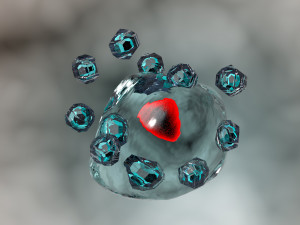It is no wonder that conventional chemo drugs cause some pretty miserable side effects. After all, they are designed to “indiscriminately kill all rapidly dividing cells to halt the growth of cancer…”

Special Delivery System to Kill Cancer: Polymer Nanoparticles
However, scientists at UT Southwestern Medical Center have “developed a synthetic polymer” of “nanoparticles” to carry the chemo medicine to the cancer cells.
At Florida Lung, Asthma and Sleep Specialists, we call this a new kind of special delivery system. Let’s take a look at this new discovery.
Meet the Nanoparticles:
Nanoparticles can best be described as very tiny spheres. If you divide the width of a human hair as a measurement, a nanoparticle would be 1,000 times smaller. The purpose of nanoparticles is simply to improve the solubility and delivery of drugs to cells. In accomplishing this purpose, the smart, new polymer nanoparticles in the UT Southwester Studies, prevent the drugs from affecting normal cells.
Again, we re-emphasize that these nanoparticles have very good taste; they can differentiate between normal cells and cancer cells. They only kill rapidly dividing cancer cells.
A New “Delivery System” for Chemotherapy Drugs
Thus, by being selective, the nanoparticles “could decrease side effects…” of the chemotherapy treatment. Because the polymer nanoparticle recognizes normal cells, the typical drug accumulation caused by chemo in normal cells would be much less.

Special Delivery System helps patients cope with side effects of chemo.
In fact, these synthetic polymer nanoparticles, developed by the Harold C. Simmons Comprehensive Cancer Center, act like very smart little drug transporters. They need not even enter normal lung cells, only cancer cells. With the polymer nanoparticles on the job, the chemo drugs only kill the cancerous cells. As an example, patients in the near future might be able to take their chemo, but keep their hair.
Dr. Daniel Siegwart, Assistant Professor of Biochemistry at UT Southwestern Medical Center and with Simmons Cancer Center, stated, “The discovery that nanoparticles can be selective to certain cells based only on their physical and chemical properties has profound implications for nanoparticle-based therapies because cell type specificity of drug carriers could alter patient outcomes in the clinic.” In summary, Dr. Siegwart explains that one of the most important benefits from the use of nanoparticles is that a patient taking chemo-therapy would have less of the traditional side-effects of his or her treatment.
Chemo-Side-Effects: A Quick Review
As many of our readers might know, the unpleasant side effects of most lung cancer chemotherapies include:
- fatigue,
- nausea,
- sore mouth and mouth ulcers,
- changes in tasting, hearing and eyesight.
- Likewise, some patients react to chemo with either diarrhea or constipation as well as hair loss. If you are researching side-effects of a specific cancer drug, you might find it listed at the Cancer Research of the United Kingdom online resource.
Scientists have explained that “a deeper understanding of nanoparticle interactions in the body opens the door to predict patient responses to existing liposome and nanoparticle therapies…”
At this point, the researchers believe there is potential for actually customizing the newly discovered polymer nanoparticles. In other words, in the future, not only will medicines be individualized, but the carriers, the nanoparticles, could be based on patient’s genetic profiles.
Main Points of Nanoparticle Polymer Research
You can read the fine details about this discovery in the “Proceedings of the National Academy of Sciences,” but the main take-aways include:
1. Research was done on hundreds of polymers before they discovered, “cells could respond differently to the same drug carrier.” Likewise, they tested the drug-carrying polymers on cancerous and normal cells from the lungs of the same patient.” The tiny polymers stayed smart.
2. Experiments were conducted and new chemical reactions were created to build an entire collection of polymers which could deliver the drugs but still distinguish between cancerous and normal cells.
3. This amazing nanoparticle discovery could be a critical step in creating individualized approaches to cancer therapy. Experts in the field stress that the nanoparticles make it possible to engineer chemo-therapy to a patient’s specific genetic makeup.
“The ability to specifically target cancer cells using nanoparticles could alter how we administer drugs to patients,” said Dr. Minna, Professor of Pharmacology and Internal Medicine, and with Simmons Cancer Center. She spoke of the hopeful purpose of the new study.
“It is already possible to use genetic sequencing to customize drug regimens for each patient. We may also be able to customize the drug carrier to predictably improve patient responses.” This means such carriers would make chemotherapy a kinder, gentler, more specific treatment.
It can be difficult to express details of extensive cancer research in plain language. However, here at Florida Lung, Asthma and Sleep Specialists, we attempt to bring you updates concerning important discoveries. To put it simply, scientists are constantly working to improve new and existing therapies for patients. The polymer nanoparticles are only one such improvements.
We want our patients, families and blog readers to know that healthcare professionals around the globe are aware of the discomfort of chemotherapy treatment. They are working to improve the side-effects as well as the efficiency of the newest therapies. With discoveries such as the polymer nanoparticles for lung cancer drug delivery, Florida Lung, Asthma and Sleep Specialists hope that patients will feel better and stronger faster after their chemotherapy.


